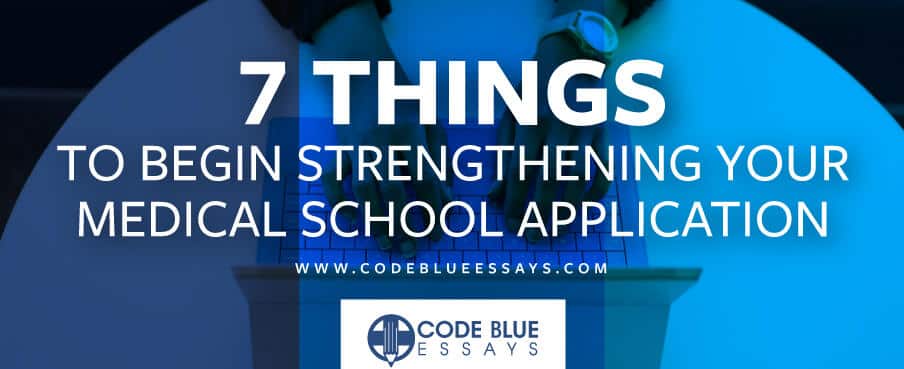7 Things you can do now to begin strengthening your medical school application
[fsn_row][fsn_column width=”12″][fsn_text]
If you’re considering applying to medical school, it’s never too early to start preparing and strengthening your application before you even apply!
What do we mean exactly? Well, if you wait to start research, or volunteer until the semester you submit your medical school application… you likely won’t be a qualified candidate. And you may have to wait a year before applying.
So, for any undergrad student who is aiming to get accepted into medical school, here are a few things you can do NOW to strengthen your application in the future…
- Volunteer. Think of extracurricular activities or non profit organizations you’re passionate about. Look for opportunities that are directly and indirectly related to healthcare. This might mean volunteering at a local health clinic, nursing home, doctors office or hospital. Indirect opportunities include things like soup kitchens, tutoring or Habitat for Humanity. Local churches are also great resources for community volunteer and service opportunities.
- Participate in research. Look for research opportunities that interest you or are in the field of study that you think or hope you might pursue in the future. Here are a few ways to find research opportunities. When you’re looking for research opportunities, think of interesting topics that aren’t too general or too narrow. You can also search for the latest information sources based on current issues, trends or developments in the medical world.
- Shadow physicians. If you know any family or friends that are physicians, this is a great place to start when it comes to looking for shadowing opportunities. If you’re in college, leverage relationships with on campus medical school, student health center of hospital. You can also contact local hospitals or physician offices. Call or email a few weeks in advance to when you would like to begin shadowing. You may want to shadow a few hours a week for several weeks or months. Dress professionally and comfortably and be sure to bring a notebook to write down questions, notes, etc. The doctor will be required to introduce you as a student who is shadowing, so be prepared to communicate with patients.
- Schedule/study for your MCAT. Most students spend between 200-300 hours preparing for the MCAT. You need a minimum of 3-6 months to prepare for this test! Consider taking a prep course and be sure to take many practice exams. Check out resources that offer free online practice tests to help strengthen your weaknesses and determine your baseline score. Once you have a baseline score let it guide your content review and sections, topics or question types you need to focus on. Also be sure to grab a copy of AAMC outline of topics that will be covered on the exam. You can also use notes and textbooks from your pre-requisite classes to help you prepare.
- Complete all prerequisites. Check early to see which prerequisites are required for your applications, and double check that you have completed them all. Most schools require:
- 1 year of biology with lab
- 1 year of general chemistry with lab
- 1 year of organic chemistry with lab
- 1 semester of biochemistry
- 1 year of physics with lab
- 1 year of english
- Identify people to write your letters of recommendation. As you take your pre-med classes, volunteer or do research, build connections and relationships with mentors that can write your letters of recommendations. You want these letters to be personal, from people who know you more than just a name on a class roll. Most schools require a minimum of three letters of recommendations: two from science professors and one from a non-science professor or supervisor. Professors are very busy so remember to ask for your letters well in advance! Several months or even the semester before is probably best! It’s normal to feel anxious about approaching professors, especially if it’s been a while since you took a class from them or worked with them. However, professors and doctors are used to getting this request and are usually very happy to help. It’s best to provide them with a copy of your CV, personal statement and anything else you think will be helpful in helping them craft a letter about you.
- Begin working on your personal statement. Use your personal statement to demonstrate your strengths and explain what you’re passionate about. At Code Blue Essays, we offer a series of online lessons and coaching to help you write a compelling personal statement. Check out our resources that have helped thousands of applicants just like you. Learn more about how to tell a compelling life story throughout your medical school application here.
Preparing for medical school can feel overwhelming, but when you begin early and take these 7 steps seriously, you will find the application process is smooth! Our team at Code Blue Essays is here to help you every step along the way.
[/fsn_text][/fsn_column][/fsn_row]
